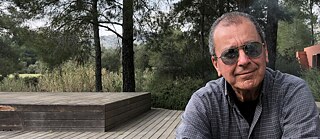Interview
Garo Keheyan

Garo you are one of the most music-loving people I know. More than twenty years ago you founded the Pharos Arts Foundation with the aim of bringing world-class musicians to Cyprus. The Pharos Arts Foundation's music concerts at the Shoe Factory and the Olive Grove are of an exceptionally high standard and give music students the opportunity to interact with world-class musicians. The Contemporary Music Festival was established over ten years ago. Since the Pharos Arts Foundation is not a continuously and adequately funded organisation by the state, funding this great music programme is a huge effort. What moves you to put so much energy time and money into these music projects?
You are right dear Karin in recognising that the Pharos project is a labour of love and sacrifice (though not without immeasurable rewards). Over the past 23 years we have transformed the cultural life of our society, particularly in the area of music, enriching the lives of thousands of people. I believe that knowledge and culture create successful societies and unless we invest in building a cultured society the future is bleak, especially for the young.
Music is a unifying and universal language - it has a healing and transformative power. Actually the whole Cosmos is built with sound and vibration and the great art music of all cultures is a vehicle to connect us to our essential core as spiritual beings and to our humanity. That is the purpose of sacred music and all great music serves this function. Therefore I believe it is essential to expose as many people as possible to it. This is why Pharos has also invested in music education for the young, with tens of thousands of students from all over Cyprus participating in our activities over the last 15 years. When people ask me why Pharos exists I say it is here to nourish and nurture the human spirit.
We do not expect the state to fund everything we do, far from it. However, what we do is self- evidently in the public interest on so many levels, that we would like to see greater support and understanding of our work from the government. They and Cyprus would only stand to benefit.
The Pharos Arts Foundation has been cooperating with the Goethe-Institut for many years. Most recently, the KUSS Quartet gave concerts at the Olive Grove on the occasion of Beethoven's 250th birthday. Ensemble Modern was here when the Pharos Arts Foundation celebrated its 20th anniversary. How long has the Pharos Arts Foundation been working with the Goethe-Institut Cyprus?
I think from the very beginning of our existence 23 years ago! We are not as old as you are, but we recognised your important contribution to the cultural life of Cyprus early on and felt the need and opportunity to collaborate was there.
What projects with the institute are particularly memorable to you?
There are so many exceptional German artists we have hosted over the years, invariably with the support of the Goethe-Institut, that it is difficult to choose! What comes to my mind immediately is the second visit of Amarcord, an extraordinary vocal ensemble with their high artistry and other worldly performances of sacred music of the mediaeval period, including in a beautiful Gothic space in the northern part of Nicosia. This was also a wonderful opportunity to bring people from all communities on the island together with the sole purpose of elevating their spirits and pointing out the larger realities that bind us together as human beings and potential friends.
I also remember fondly the visit of the Akademie für Alte Musik Berlin. After their concert in Nicosia we visited the recently purchased Olive Grove. Following a hearty lunch and plenty of wine the musicians gave an impromptu concert in this sacred place for the first time, playing their instruments while walking about among the thousand year old olive trees! I felt at the time that this could be the beginning of many wonderful concerts in the Olive Grove - something that materialised in the years that followed.
Also memorable was the screening of a documentary on the legendary Boy’s Choir of St. Thomas Kirche in Leipzig where Bach was Kapellmeister once, which coincided with their visit and performance. A historic and moving occasion.
What is special about the cooperation between the Pharos Arts Foundation and the Goethe-Institut? What distinguishes the cooperation?
It is a collaboration and cooperation that we value highly. For us it is special because we recognise your commitment and interest in promoting culture and your willingness to see it as a priority and invest in it for the benefit of others. Our relationship is also based on trust and respect for each other I think. We both realise that through dialogue and creative exchanges we have actually achieved quite a lot together!
: The Goethe-Institut Cyprus is 60 years old this year, only one year younger than the Republic of Cyprus. What do you wish for the institute in the coming years?
First of all I would like to congratulate the Goethe-Institut for being here from the very beginning. It showed a commitment and a seriousness of purpose. Germany has a huge and admirable intellectual and cultural legacy, particularly in musical culture. Giants like Bach and Beethoven are figures of universal relevance, feeding the soul of humanity with their eternal music. I hope the Goethe-Institut will continue and thrive in Cyprus for many years to come and that it will bring the very best and highest expressions of German culture to our island and its people.